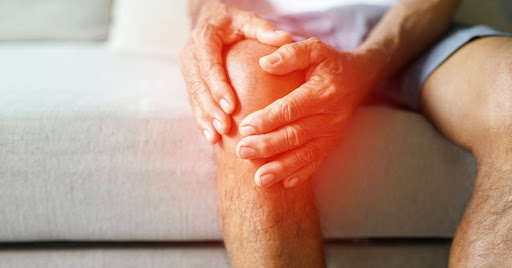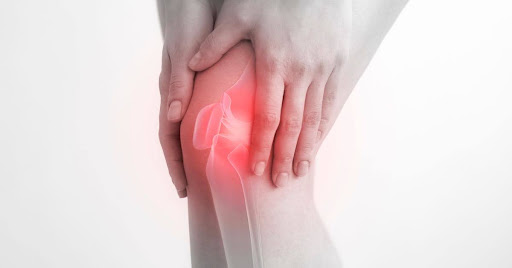What Causes Joint Pain? Common Reasons Explained
3 min read
By DocGenie , Published on - 05 January 2025 Joint pain is a widespread health issue affecting people of all ages. It can be mild and short-lived or chronic and disabling, depending on the underlying cause. From sudden injuries to long-term diseases like arthritis, many conditions can trigger pain in one or more joints.
Joint pain is a widespread health issue affecting people of all ages. It can be mild and short-lived or chronic and disabling, depending on the underlying cause. From sudden injuries to long-term diseases like arthritis, many conditions can trigger pain in one or more joints.This article explains the most common reasons behind joint pain, associated symptoms, and when to seek medical help.
What Is Joint Pain?
 Joint pain refers to discomfort, soreness, or inflammation in any joint—the area where two bones meet. It may affect a single joint (like a knee or shoulder) or multiple joints across the body.
Joint pain refers to discomfort, soreness, or inflammation in any joint—the area where two bones meet. It may affect a single joint (like a knee or shoulder) or multiple joints across the body.How Does It Feel?
- Stiffness or limited range of motion
- A dull ache or sharp stabbing sensation
- Swelling, redness, or warmth around the joint
- Clicking or grinding noises during movement
What Are the Common Causes of Joint Pain?
 Joint pain can be caused by temporary conditions or chronic diseases. Here's a breakdown of the most frequent causes:
Joint pain can be caused by temporary conditions or chronic diseases. Here's a breakdown of the most frequent causes:- Osteoarthritis
- Most common in older adults
- Caused by wear and tear of cartilage
- Often affects knees, hips, hands, and spine
- Rheumatoid Arthritis
- Autoimmune condition
- Affects joints on both sides of the body
- Often includes fatigue and low-grade fever
- Injuries
- Sports injuries, sprains, or fractures can cause sudden joint pain
- Damage to ligaments or cartilage (e.g., torn meniscus)
- Gout
- Caused by uric acid buildup
- Typically affects the big toe but can occur in other joints
- Sudden, severe pain with swelling and redness
- Infections (Septic Arthritis)
- Bacterial or viral infections in the joint space
- Often accompanied by fever and extreme tenderness
- Lupus and Other Autoimmune Conditions
- Inflammation caused by the immune system attacking healthy tissue
- Bursitis or Tendinitis
- Inflammation of fluid-filled sacs (bursae) or tendons around joints
Why Does Sudden Joint Pain Occur?
Sudden onset joint pain may indicate an acute injury, infection, or flare-up of a chronic disease.Possible Reasons:
- Ligament tear or joint dislocation
- Gout flare
- Septic arthritis
- Viral infection (like chikungunya or dengue)
Immediate medical evaluation is crucial when joint pain is sudden and severe, especially if accompanied by fever or inability to move the joint.
What Are the Symptoms That May Accompany Joint Pain?
Understanding accompanying symptoms helps identify the root cause.Watch for:
- Swelling or warmth around the joint
- Morning stiffness lasting more than 30 minutes
- Visible deformity or misalignment
- Pain aggravated by activity or rest
- Fever, fatigue, or unexplained weight loss
How Is Joint Pain Diagnosed?
Doctors use various tools to pinpoint the cause of joint pain:Diagnostic Tests:
- Physical examination and history taking
- Blood tests (e.g., CRP, ESR, Rheumatoid Factor)
- Imaging tests (X-rays, MRI, ultrasound)
- Joint fluid analysis (for suspected infection or gout)
What Are the Treatment Options for Joint Pain?
Treatment depends on the underlying cause and severity of symptoms.Common Treatments:
- Pain relievers (paracetamol, NSAIDs)
- Anti-inflammatory medications
- Physical therapy to improve flexibility and strength
- Hot/cold therapy for symptom relief
- Joint injections (steroids or hyaluronic acid)
- Surgery (in severe cases like joint replacement)
Can Joint Pain Be Prevented?
While not all joint pain is preventable, certain habits can protect your joints and delay wear and tear.Prevention Tips:
- Maintain a healthy weight to reduce joint stress
- Stay active with low-impact exercises (like swimming or walking)
- Strengthen muscles around joints through strength training
- Practice good posture
- Use ergonomic furniture and supportive shoes



